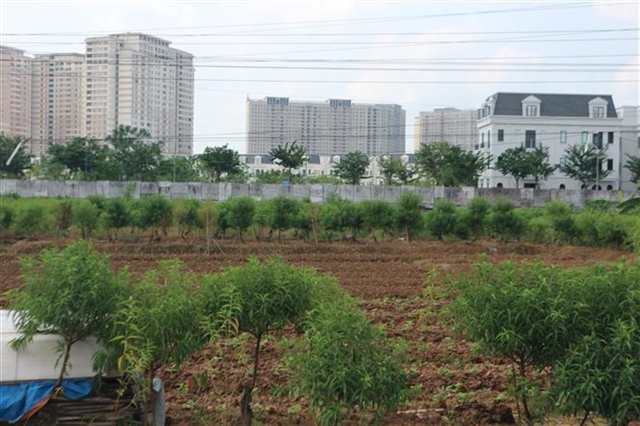Despite government efforts to decentralise, many projects still need approval at both central and local government levels, complicating matters.

HÀ NỘI — Administrative bottlenecks continue to burden investment projects, despite recent reforms aimed at streamlining procedures, according to the Việt Nam Chamber of Commerce and Industry (VCCI).
At the launch of its 2024 Legal Development Report, VCCI highlighted the 'green-lane' investment mechanism as a rare positive development in an otherwise complex regulatory landscape. The streamlined process was introduced through Law No. 57/2024/QH15 amending the Law on Investment, and came into force earlier this year.
Under the mechanism, investors are required to complete only two procedures: obtaining an investment registration certificate and an environmental permit. Other approvals, including those for construction, fire safety and technology assessment, are handled post-licensing.
According to the law’s drafting committee, this process cuts administrative time by up to 260 days, reducing it to just 15 days. However, the green-lane route is currently limited to certain sectors and geographic areas, such as industrial parks and high-tech zones.
Nguyễn Thị Diệu Hồng, legal expert at VCCI’s Legal Department, noted that even this significant time saving only serves to highlight the scale of delays under the standard process.
“For a typical land-use project, an investor must complete at least 15 separate procedures in the preparation phase alone,” she said.
“These involve multiple laws, on investment, land, construction, environment, planning, fire prevention, and require working with agencies at both the central and local levels.”
Despite government efforts to decentralise, many projects still need approval at both levels, further complicating implementation.
VCCI’s research found that investors frequently struggle to navigate overlapping and frequently amended laws. A single project may fall under 12 laws and 20 decrees or circulars, in addition to local-level rules.
“There is no single legal document that clearly outlines the steps and procedures for implementing a project,” Hồng said.
“Investors must interpret everything themselves, which is particularly challenging for newcomers or foreign businesses.”
Some procedures, such as land auctions or selection of investors through bidding, lack clear deadlines and depend entirely on local decisions, according to the research. Others, such as environmental impact assessments, have defined timeframes, but delays are common and often ripple through other dependent procedures.
Hồng added: “Our surveys show that for land-use projects, the process typically takes between 18 to 24 months if things go smoothly. On average, it takes two to three years just to complete administrative requirements before project implementation can begin.”
Businesses held back by red tape
The burden of complex procedures is reflected in the 2023 Provincial Competitiveness Index (PCI), which surveyed 10,000 businesses. The report found that 73 per cent of enterprises had postponed or cancelled business plans due to difficulties with land-related procedures.
The findings also revealed that 64 per cent of firms experienced delays beyond legal timelines, and 44 per cent pointed to excessive delays in land valuation.
The situation may improve from August 2024 when new laws on land, housing and real estate take effect. These are expected to resolve some long-standing regulatory overlaps. However, legal experts say key ambiguities remain.
Lawyer Phạm Thanh Tuấn from the Hà Nội Bar Association pointed to contradictions between the revised Land Law and Decree 103/2024/NĐ-CP. The law requires land auctions only for lump-sum land payments, but the decree extends this requirement to annual lease payments, causing confusion for local authorities.
Similarly, the Land Law allows for state land recovery for sports projects, but does not clearly state whether golf courses qualify. Inconsistent interpretations have emerged: while Thái Bình Province allows state land recovery for golf projects, Quảng Ninh requires private land transfers.
Investment manual
Despite the government’s continued review of legal documents, VCCI warned that inconsistencies, overlaps and vague provisions persisted.
Hồng said a significant factor affecting project implementation was the uneven capacity of local authorities. In one case, an industrial park infrastructure project was delayed because the cleared land did not include areas earmarked for public utilities in the detailed plan. The investor was told to revise the plan and reapply for investment approval, resetting the process.
“In the context of decentralisation, local governments now handle most investment-related procedures,” she said.
“So their administrative capacity directly affects how smooth the process is.”
To support investors, VCCI was calling for an official manual detailing the steps, requirements and responsible agencies for different types of investment projects. This should be made publicly available on government portals to improve transparency and ease of access.
VCCI also proposed simplifying the legal system by consolidating overlapping regulations and accelerating digital transformation. This should include creating online portals that provide updated legal information and track application status.
Hồng added: “In the short term, the green-lane mechanism should be expanded to more sectors and regions.
“But this must be accompanied by effective post-licensing oversight to ensure compliance.” VNS





